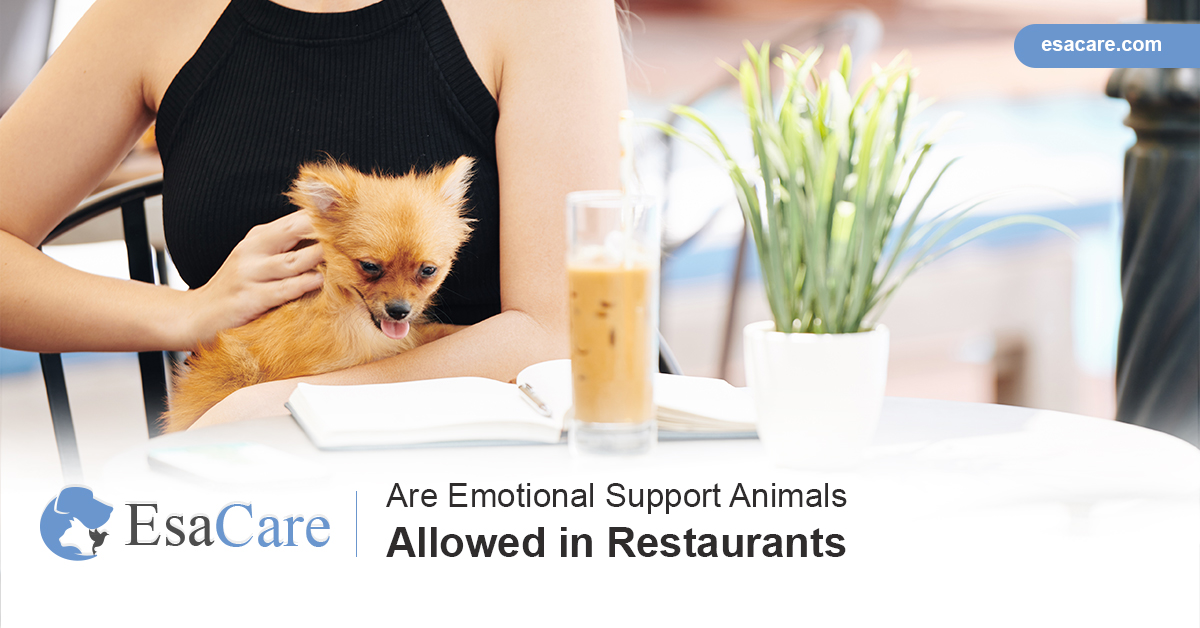The presence of emotional support animals in restaurants has sparked debate & confusion regarding their legality. While there are laws protecting individuals with disabilities & their service animals, emotional support animals do not have The same legal rights. Restaurants can choose To allow these animals, but are not required To do so. However, it is important for establishments To understand The difference between service animals & emotional support animals, in order To comply with The law & accommodate customers with disabilities appropriately.
Emotional Support Animals: The Restaurant Dilemma and the Laws Surrounding Their Presence. Discover how emotional support animals are affecting The restaurant industry & The laws that govern their presence. This article simplifies The discussion, making it easy To understand without any complicated jargon. Join The conversation as we explore this challenging dilemma.
What is Emotional Support Animals: The Restaurant Dilemma & The Laws Surrounding Their Presence & how does it work?
An Emotional Support Animal (ESA) is a companion animal that provides therapeutic support To individuals with emotional or mental health conditions. ESAs are not The same as service animals & do not require specialized training. However, they offer comfort & alleviate symptoms of anxiety, depression, & other psychological disorders.
In The context of restaurants, individuals with ESAs face a dilemma. While these animals provide essential support, their presence in dining establishments can conflict with health & safety regulations. The laws surrounding The presence of ESAs in restaurants aim To strike a balance between ensuring access for individuals who benefit from their companionship & maintaining a safe & hygienic environment for all patrons.
A brief history of Emotional Support Animals: The Restaurant Dilemma & The Laws Surrounding Their Presence
The concept of utilizing animals for emotional support dates back To ancient civilizations. The bond between humans & animals has long been recognized for its therapeutic effects. However, it was only in recent years that The use of ESAs gained prominence.
In The United States, The Air Carrier Access Act (ACAA) of 1986 was The first federal law To address The rights of individuals with disabilities traveling by air. It allowed individuals To bring their ESAs on commercial flights. Over time, various states enacted laws that expanded The rights of individuals with ESAs To access public places, including restaurants.
How To implement Emotional Support Animals: The Restaurant Dilemma & The Laws Surrounding Their Presence effectively
Effective implementation of The laws surrounding The presence of ESAs in restaurants requires clear guidelines & expectations for both restaurant owners/managers & individuals with ESAs.
1. Education & Awareness: Restaurants should educate their staff about The laws regarding ESAs & provide training on how To accommodate individuals with ESAs while upholding health & safety regulations.
2. Establishing Policies: Restaurants should develop clear policies that outline The process for accommodating individuals with ESAs. This includes specifying any restrictions or requirements, such as providing proof of The animal’s training or certification.

3. Communication: It is crucial for both restaurant staff & individuals with ESAs To engage in open & respectful communication. This ensures that any concerns or issues regarding The presence of The animal can be addressed promptly & effectively.
The key benefits of using Emotional Support Animals: The Restaurant Dilemma & The Laws Surrounding Their Presence
The presence of ESAs in restaurants offers several benefits for individuals with emotional or mental health conditions:
1. Emotional Support: ESAs provide companionship & emotional stability, reducing feelings of anxiety, depression, & stress.
2. Increased Social Interaction: ESAs often serve as ice-breakers, facilitating social interaction for individuals who may otherwise feel isolated or uncomfortable in public settings.
3. Improved Mental Well-being: Interacting with animals has been shown To release endorphins, promoting a positive mood & improving overall mental well-being.
4. Sense of Security: For individuals with anxiety or post-traumatic stress disorder (PTSD), having an ESA can provide a sense of security & reassurance in public spaces.
Challenges associated with Emotional Support Animals: The Restaurant Dilemma & The Laws Surrounding Their Presence & potential solutions
While The presence of ESAs in restaurants can be beneficial, several challenges arise in implementing & regulating their presence:
1. Health & Safety Concerns: Allowing animals in dining establishments raises concerns about hygiene & The potential for allergic reactions. Restaurants can address this by implementing strict cleanliness protocols & designating specific areas for individuals with ESAs.
2. Fraudulent Claims: Some individuals falsely claim that their pets are ESAs To gain access To public places. To address this, proper documentation & certification processes can be established, ensuring that only legitimate ESAs are granted access.
Future trends & innovations expected in Emotional Support Animals: The Restaurant Dilemma & The Laws Surrounding Their Presence
As The understanding & acceptance of mental health conditions & The importance of ESAs continue To evolve, we can expect future trends & innovations in this field:
1. Improved Certification Processes: We may see The development of standardized certification processes for ESAs, ensuring credibility & reducing fraudulent claims.
2. Technological Solutions: Technology advancements may provide innovative solutions, such as virtual reality experiences, To simulate The therapeutic benefits of ESAs in restaurant settings.
3. Legislative Updates: Laws surrounding The presence of ESAs in restaurants are likely To be continuously updated & refined To address emerging challenges & accommodate changing societal attitudes towards mental health.
In conclusion, Emotional Support Animals offer critical support To individuals with emotional or mental health conditions. While their presence in restaurants presents a dilemma, implementing clear guidelines & communication can help balance The needs of individuals with ESAs & maintain a safe dining environment for all patrons. As our understanding & awareness of mental health grow, we can expect further advancements & innovations in The laws surrounding The presence of ESAs in public spaces.

The Growing Presence of Emotional Support Animals
In recent years, The presence of emotional support animals (ESAs) has become increasingly common in various public settings, including restaurants. These animals provide comfort & support To individuals suffering from mental health conditions such as anxiety, depression, & post-traumatic stress disorder. While The presence of ESAs can be incredibly beneficial for those who rely on them, it has also sparked a debate regarding their presence in restaurants & The laws surrounding their accommodation.
Despite The controversy, many individuals with ESAs argue that these animals play a crucial role in their well-being. The companionship & emotional support provided by these animals can alleviate symptoms of anxiety & help individuals feel more comfortable in public spaces. However, restaurant owners & staff often face challenges when it comes To accommodating The presence of ESAs while ensuring a pleasant dining experience for all customers.
The Legal Framework Surrounding ESAs in Restaurants
The laws regarding The presence of ESAs in restaurants can be complex & vary from state To state. In general, The Americans with Disabilities Act (ADA) governs The rights of individuals with disabilities & their access To public places, including restaurants. However, The ADA does not specifically address The presence of ESAs in these establishments.
Instead, The ADA primarily covers service animals, which are defined as dogs that are individually trained To perform tasks for people with disabilities. Service animals are granted access To almost all public places, including restaurants, as they are considered essential To assist individuals with disabilities. However, ESAs do not fall under The same category as service animals, & their rights & access differ.
The U.S. Department of Housing & Urban Development (HUD) defines ESAs as animals that provide support, companionship, & relief To individuals with disabilities. While ESAs are not considered service animals under The ADA, they are protected under The Fair Housing Act (FHA) in housing situations. However, The FHA does not extend The same protection To ESAs in public spaces, such as restaurants.
The Challenges Faced by Restaurant Owners
The presence of ESAs in restaurants poses several challenges for owners & staff. One of The primary concerns is ensuring The safety & comfort of all customers. While The majority of ESAs are well-behaved & properly trained, there have been instances where animals have caused disruptions or uncomfortable situations for other patrons. This can include issues such as allergies, fear of animals, or interference with The dining experience.
Another challenge restaurant owners face is determining The legitimacy of an ESA. Unlike service animals, which must undergo specific training, there are no standardized guidelines or certifications for ESAs. This lack of regulation makes it difficult for restaurant owners & staff To differentiate between legitimate ESAs & pets that may not have The same level of training or temperament.
Additionally, some restaurant owners express concerns about The potential for abuse or misuse of The ESA system. There have been cases where individuals have attempted To pass off their pets as ESAs To gain access To public spaces. This misuse undermines The rights of individuals who genuinely rely on The support of ESAs & creates further challenges for restaurant owners in navigating The presence of these animals.
The Importance of Education & Dialogue
Amidst The ongoing debate surrounding The presence of ESAs in restaurants, education & dialogue play a crucial role. It is essential for both individuals with ESAs & restaurant owners To understand The laws & regulations surrounding these animals. This knowledge can help foster an environment that balances The rights & needs of individuals with disabilities while also ensuring The overall comfort & safety of all customers.
Restaurant owners can take proactive measures by educating their staff on The legal rights & responsibilities regarding ESAs. Implementing clear policies & guidelines can help staff handle situations involving ESAs in a respectful & informed manner. Similarly, individuals with ESAs can also benefit from understanding The challenges faced by restaurant owners & cooperating with any reasonable requests To ensure a positive dining experience for everyone.

Emotional Support Animals: The Restaurant Dilemma & The Laws Surrounding Their Presence
The Rise of Emotional Support Animals
Emotional support animals (ESAs) have become increasingly common in recent years. These animals provide comfort & companionship To individuals who have emotional or mental health conditions. ESAs are not The same as service animals, which are trained To perform specific tasks for people with disabilities. Instead, ESAs offer emotional support & alleviate symptoms of anxiety, depression, & other mental health disorders.
The use of ESAs has sparked a dilemma in The restaurant industry. While some patrons argue that their animals offer necessary support, others raise concerns about hygiene, allergies, & safety. As a result, The presence of ESAs in restaurants has become a controversial topic, with varying laws & regulations across different jurisdictions.
Understanding The Difference: Service Animals vs. Emotional Support Animals
Before delving into The restaurant dilemma, it’s crucial To distinguish between service animals & emotional support animals. Service animals are trained To perform specific tasks that aid individuals with disabilities. These tasks can range from guiding The blind To alerting those with hearing impairments of sounds. Service animals are protected by The Americans with Disabilities Act (ADA), allowing them access To public places, including restaurants.
On The other hand, emotional support animals do not require specific training & their purpose is To provide emotional comfort & support To individuals with mental health conditions. While they are not granted The same legal protections as service animals, they are covered under The Fair Housing Act, which allows individuals To have their ESA with them in their homes, including rented properties.
The Restaurant Dilemma: Balancing Access & Safety
Restaurants face a challenging predicament when it comes To accommodating ESAs. On one hand, they are obligated To follow health & safety regulations, ensuring a clean & allergen-free environment for all patrons. On The other hand, they must consider The rights & needs of individuals with ESAs.
When handling requests from patrons with ESAs, restaurant owners & staff should be aware of The laws & regulations specific To their jurisdiction. While The ADA does not grant public access rights To ESAs, some state & local laws may afford them certain privileges. It is important for restaurants To familiarize themselves with these laws To avoid potential conflicts & legal repercussions.
The Laws Surrounding ESA Access To Restaurants
The laws surrounding ESAs in restaurants vary from state To state & even within different local jurisdictions. While some states allow ESAs To accompany their owners in restaurants, others have stricter regulations or no specific provisions regarding ESAs in these settings.
It is important for individuals with ESAs & restaurant owners alike To research & understand The laws in their specific area. This will help ensure compliance & prevent any unnecessary confrontations or misunderstandings.
Personal Experience
In my own experience, I have encountered individuals with ESAs in restaurants. While some restaurant staff were accommodating & understanding, others were not familiar with The laws & requirements surrounding ESAs. This lack of knowledge can lead To confusion & disputes between patrons & restaurant employees.
The Importance of Education & Awareness
To alleviate The dilemma surrounding ESAs in restaurants, education & awareness are crucial. Restaurant owners & staff should receive training on The laws & regulations pertaining To ESAs. This will enable them To properly handle requests from individuals with ESAs & create a welcoming environment for all patrons.
Additionally, individuals who rely on ESAs should be aware of their rights & responsibilities. They should carry appropriate documentation, such as a letter from a licensed mental health professional, To validate The need for their ESA. This documentation can help prevent misunderstandings & facilitate a smoother experience when dining out.
The Need for Clear Guidelines
To further address The restaurant dilemma, clear & comprehensive guidelines should be established at The national level. These guidelines can provide uniformity & consistency across different states & jurisdictions, ensuring that both individuals with ESAs & restaurant owners understand their rights & responsibilities.
The presence of emotional support animals in restaurants raises complex issues that require careful consideration. Balancing The rights & needs of individuals with ESAs with The responsibility of restaurant owners To provide a safe & comfortable environment can be challenging.
By educating restaurant staff, individuals with ESAs, & implementing clear guidelines, we can work towards a solution that ensures The well-being of all patrons while respecting The rights of individuals with emotional support animals.
Source: [Reddit](https://www.reddit.com/r/service_dogs/comments/8rzv35/are_esa_allowed_in_restaurants_like_service/)
Can restaurant owners refuse To allow emotional support animals in their establishments?
No, according To The U.S. Department of Justice, restaurant owners are not allowed To refuse entry To individuals with emotional support animals as long as The animal is well-behaved & The person has a valid emotional support animal letter from a licensed mental health professional.
Do emotional support animals have The same rights as service animals?
No, emotional support animals differ from service animals in terms of their legal rights. While service animals are trained To perform specific tasks for individuals with disabilities, emotional support animals provide comfort & support through their mere presence. As a result, emotional support animals are not granted The same level of access To public places as service animals.
Can emotional support animals go anywhere with their owners?
No, emotional support animals are not allowed in all public places. While they are allowed in certain areas such as housing & airplanes, they may be restricted from entering certain establishments like restaurants where food is prepared & served. However, many states have passed laws granting emotional support animals access To certain public places, so it is important To check local regulations.
What should I do if a restaurant owner denies entry To my emotional support animal?
If you encounter a situation where a restaurant owner refuses To allow your emotional support animal inside, you can calmly explain your rights & show them The valid emotional support animal letter. If The issue persists, you may consider filing a complaint with The U.S. Department of Justice or contacting a local disability rights organization for further assistance.
Are emotional support animals required To wear any identification?
No, emotional support animals are not required To wear any specific identification or vest. However, it is recommended To have your animal wear identifiable gear or accessories, such as a harness or vest, To help distinguish them as an emotional support animal & minimize any confusion or misunderstandings in public places.
Conclusion
In conclusion, The issue of emotional support animals in restaurants raises a complex dilemma. On one hand, these animals provide crucial support & comfort To their owners, helping them manage their mental health conditions & lead more fulfilling lives. On The other hand, their presence can potentially disrupt The dining experience of other patrons & pose health & sanitation concerns.
The laws surrounding emotional support animals in restaurants aim To strike a balance between these competing interests. While some states provide legal protections for these animals, others leave it up To The discretion of individual restaurant owners. This lack of consistency creates confusion & inconsistency in The treatment of emotional support animals.
The Restaurant Dilemma and the Laws Surrounding
To address this issue, it is important for lawmakers To establish clear guidelines & standards for emotional support animals in restaurants. This should include training & certification requirements for both The animals & their owners, as well as guidelines for how restaurants can accommodate their presence without compromising The comfort & safety of other patrons.
Additionally, it is crucial for restaurant owners & staff To receive education & training on how To handle situations involving emotional support animals. This will help them better understand The importance of these animals & how To appropriately & respectfully accommodate them.
Ultimately, finding a solution that respects The rights & needs of individuals with emotional support animals while ensuring The smooth functioning of restaurants will require collaboration & open dialogue between all stakeholders. By working together, we can create a more inclusive & supportive environment for everyone involved.
